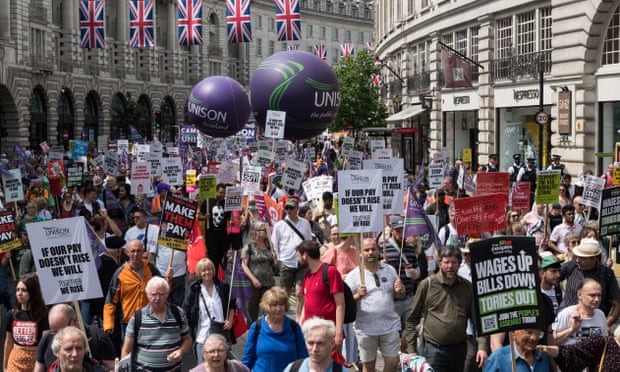Teachers and nurses ‘ready to quit’ over delays to pay rises, union leaders warn
Newly appointed cabinet ministers are under pressure to swiftly resolve wage deals for public sector workers or face them leaving their professions in coming weeks

A protest in London last month against the government's handling of the cost of living crisis and call for pay rises for public sector workers.
Photograph: Anadolu Agency/Getty Images
Toby Helm
Toby Helm
THE GUARDIAN
Sun 10 Jul 2022
Union leaders have warned newly appointed cabinet ministers that many teachers and nurses will quit their professions in the coming weeks if public sector pay deals are further delayed by chaos at the top of government.
The decision on Thursday by Boris Johnson to step down as prime minister – and a series of changes to his cabinet – have left public sector workers increasingly fearful that long-overdue pay rises will be pushed back to the autumn.
Even before the implosion of the Johnson government last week, unions were already on collision course with it over the extent of any pay increases – and were warning of possible strike action if their demands were not met.
Teachers, NHS workers and others in the public sector have been demanding increases of at least the rate of inflation – currently 9.1% – while ministers had been insisting that pay restraint was necessary because the Treasury needs to limit spending and curb inflation.
Now, however, there is anxiety that the already delayed pay process, including consultations with unions, will be delayed further, meaning many workers will quit in frustration. The impasse over pay – and threats of strikes – will be one of the most pressing issues facing the government as the Conservative party prepares to select a new leader and prime minister.
On Saturday the country’s biggest union, Unison, said it had written to the new health secretary, Stephen Barclay, demanding to see the as yet unpublished recommendations of the NHS pay review body. It also reiterated warnings about possible industrial action unless progress was made quickly.
Unison’s head of health, Sara Gorton, said: “The government’s leadership vacuum is no excuse for further delay on putting NHS pay right. The government is already months behind its own timetable. Surging costs are having a terrible effect on staff and helping them should be top of the priority list for the new secretary of state, not an afterthought.”
In her letter to Barclay, Gorton added: “The ambitious targets to reduce waiting times and remove the elective backlog will not be met without urgent pay action from you to prevent people leaving the health service.
“NHS staff cannot afford to wait for the leadership matters in your party to be settled before announcing your pay position. I will be talking to other unions about coordinating our plans, including consultative ballot options over inaction.
“Pay is crucial in making sure the NHS is properly staffed and able to provide the care patients need. Giving a proper wage award will show that ministers are serious about protecting the health service and the millions who rely on it.”
Patrick Roach, general secretary of the National Association of Schoolmasters Union of Women Teachers, has also written to the new education secretary, James Cleverly, asking for publication of the review body recommendations for teachers.
Roach said it was essential that agreement was reached as soon as possible so that teachers did not leave the profession before the beginning of the new school year. “What is important is that process is not kicked into the long grass. We must ensure that full consultation takes place and that teachers get what they deserve.”
The TUC’s general secretary, Frances O’Grady, said: “The government may be in chaos, but ministers must not forget the cost of living crisis facing workers. Britain needs a pay rise now.”
A government spokesperson said: “The government wants a fair pay deal for nurses, doctors and the taxpayer, and is carefully considering the recommendations from the independent pay review bodies.
“We are incredibly grateful to all NHS staff and they received a 3% pay rise last year – increasing nurses’ pay by £1,000 on average despite a public sector pay freeze – and we are giving NHS workers another pay rise this year.”
This article was amended on 10 July 2022 to add a comment from a government spokesperson that was received after publication.
No comments:
Post a Comment